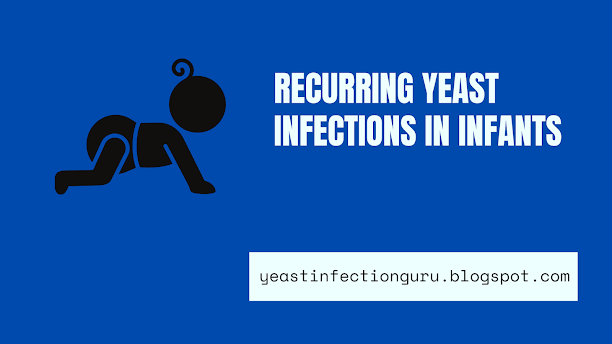
The occurrence of yeast infections four times in any given year is classified as recurring and if left unchecked or the cause for the yeast infection undiscovered, these occurrences can lead to the risk of more serious problems, such as a weakened immune system or chronic urinary tract infections.
Recurring yeast infections or chronic yeast infection is not only annoying but it can also put you at risk of other illnesses. When you have more than four infections in a year, you have a condition known as recurring yeast infection.
Yeast infections in babies are common. Infants can catch a yeast infection during birth from their mothers, where the yeast is naturally present. The yeast infection will start to show on the baby’s skin within a few hours of birth. Babies that are on antibiotics or breastfeeding babies who’s mothers are on antibiotics are more susceptible to yeast infections and parents should be extra vigilant to prevent yeast infections. Another cause of recurring yeast infection is food, especially sugars and sweet treats. If a breastfeeding mother’s diet is high in these, she can pass on the yeast infection through her breast milk to her infant.
Many infants get an oral yeast infection known as thrush. Infants get thrush because yeast is everywhere and infants are more susceptible to this than healthy adults. The symptoms include white patches on the tongue and inner cheeks. The treatment for thrush is often a prescription of Nystatin.
Breastfeeding children with thrush will likely pass the infection to their mother’s nipples (mastitis) causing a painful infection. Mothers should be treated along with their child to avoid passing the infection back and forth.
It is also important for recurring yeast infection sufferers to become familiar with the possible causes of their infections. While many patients with recurring yeast infections are eventually placed on prescription medications, medical professionals are reluctant to use this course of treatment because of the possibility of becoming immune to the drug.
The problem with conventional medicine is that it generally does not restore a healthy body ecology, allowing a recurring yeast infection.
Skin infections involving Candida species can become a recurring yeast infection whenever the conditions leading to the infection do not change. If those with recurring yeast infections of the skin do not keep the affected areas clean and dry, even after the infection is treated, recurrences are likely. Perhaps the most severe form of a recurring yeast infection is that which affects the bowels. Candida overgrowth in the colon may not affect the bowel function but, instead, provide a reservoir for recurring yeast infections in other body areas, especially in the urogenital tract.
A proper diagnosis is very important to ensure you receive the most appropriate and effective treatment to cure your yeast infection. Some products merely relieve the symptoms, and others cure the infection.











0 comments:
Post a Comment